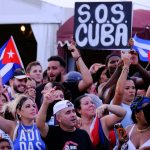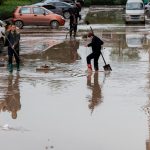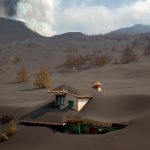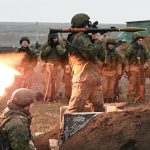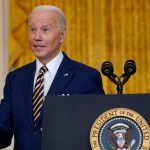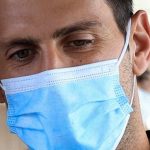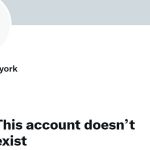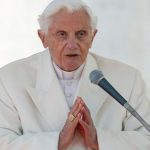Prosecutors in Italy are urging the World Health Organisation to assist them in their investigations into Italy’s response to the COVID-19 pandemic.
So far, the WHO has failed to answer any of a series of questions sent from the prosecutor’s office in Bergamo, one of the hardest-hit communities in the country.
The investigators are particularly surprised the health body instructed staff not to cooperate, claiming they had immunity from questioning; but they allegedly went even further by writing to the Italian health ministry urging them to tell the investigators to ease up the pressure on the WHO.
This was according to documents obtained by the prosecutors, which they showed to Sky News.
Please use Chrome browser for a more accessible video player
It comes as a former WHO employee, who is assisting the investigation, says the organisation tried to force him to change a key report that noted that Italy had not updated its pandemic response protocols since 2006.
Dr Francesco Zambon has now resigned from his position as a coordinator, a senior post at the WHO, after 13 years of service, claiming his employers failed to follow its own “whistleblower” guidelines by ignoring his demands for a full investigation into his claim of interference by seniors.
Early last year, Italy was the epicentre of the coronavirus outbreak, weeks before the rest of the developed world.
The chaotic scenes of overwhelmed hospitals in northern Italy prompted the World Health Organisation to provide real-time analysis to help governments around the world to prepare.
Dr Zambon, with a team of nine scientists, was tasked with sending a detailed plan to all nations on how to cope, based on Italy’s response. It was the first time this type of report had ever been attempted.
The report “An unprecedented challenge: Italy’s first response to COVID-19” was produced in record time.
After an internal WHO review, it was published and distributed on 13 May – but was unexpectedly withdrawn the next day.
There are conflicting testimonies over why the report was pulled. One reason given was a date error in the timeline for the development of the pandemic in China, which was rectified in a matter of hours, according to Dr Zambon.
Despite the correction, the report was never republished.
Dr Zambon maintains the real reason for the report being withdrawn was that his team identified the Italian government’s failure to update its pandemic protocols for 14 years.
WHO officials have denied this, but prosecuting investigators in Bergamo have since obtained emails and WhatsApp messages that back up Dr Zambon’s central claim that he was told to change that section of the report.
In response to Sky News, the World Health Organisation says the report was a “regional document prematurely published by the WHO Regional Office for Europe (EURO).
“The data and information contained in the report had not been fact-checked and contained inaccuracies and inconsistencies. It should not have been published and it was withdrawn by EURO (under the authority of the Regional Director, EURO).”
Italy was not unique in being ill-prepared, or for failing to update its protocols – many other countries found themselves in a similar position.
The Bergamo prosecutors have told Sky News that in itself, this oversight is not hugely important and would not have been a central part of their investigation, until they discovered evidence of interference in the composition of the report.
Dr Zambon says the affair has undermined the World Health Organisation’s reputation, and by pulling the report, it undermined the ability of governments around the globe to react to the pandemic more successfully.
“They could have had what we didn’t have, time,” he told me at his home in Venice.
“We [in Italy] didn’t have time to prepare, but this report would have allowed them to buy time, which was by far the most important route for getting better prepared for the pandemic.”
“I think that the problem here is about the lack of independence and lack of transparency of the World Health Organisation.
“The mandate of the organisation is to preserve, to promote the health of the citizens of the entire world… and the story that happened in a year shows that the organisation is bound by personal interests, by governments’ interest, and by financial powers,” he said.
We met Bergamo’s chief prosecutor and the assistant prosecutor, who is in direct charge of the investigation, at their offices in the centre of the city.
It is clear they are perplexed by the attitude of the WHO and are determined to get to the bottom of its apparent reluctance to assist in their investigation into why so many people died.
Antonio Chiappani, the chief prosecutor, said Bergamo-style investigations will likely be set up in countries across Europe, and those investigations too will want assistance from the WHO.
For now they remain confused and suspicious, and are talking to Dr Zambon.
“The problem for us is still not knowing why there was this pandemic explosion here,” Mr Chiappani told me.
“They [the World Health Organisation] are turning this investigation into, I am not saying a plot, but something political and also international and that was not our intention.
“This is what I did not understand: why they did not intend to help us to clarify, to understand both the good things and any mistakes especially for the future and not only for the Italian future, but for the future of other nations that a few months later had the same problems…”
When asked why it was hesitant to cooperate with the prosecutor’s office, the World Health Organisation clarified to us: “It is WHO practice to always assist local authorities in such matters as appropriate.
“WHO is currently reviewing a request for international judiciary assistance from the Office of the Public Prosecutor in Bergamo.”
The prosecutors say the testimony of Dr Zambon, and any evidence he possesses, continues to be part of their investigation to bring some answers to the families of those who died.
Preliminary findings into that investigation are expected next month.




